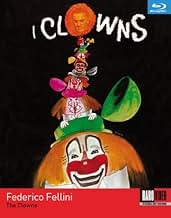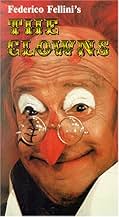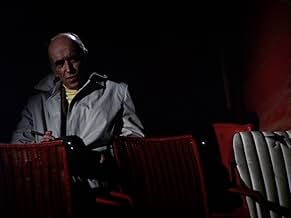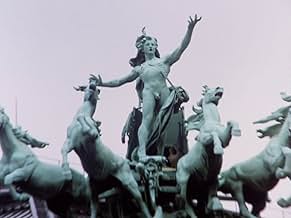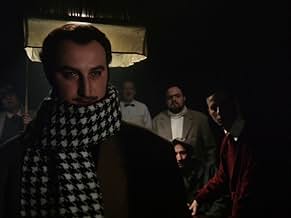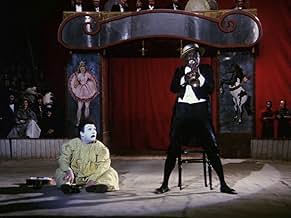NOTE IMDb
7,0/10
3 k
MA NOTE
Fellini explore une obsession de son enfance dans un mélange de souvenirs et de faux documentaire sur les clowns de cirque.Fellini explore une obsession de son enfance dans un mélange de souvenirs et de faux documentaire sur les clowns de cirque.Fellini explore une obsession de son enfance dans un mélange de souvenirs et de faux documentaire sur les clowns de cirque.
- Récompenses
- 4 victoires et 2 nominations au total
Riccardo Billi
- Clown
- (as Billi)
Gigi Reder
- Clown
- (as Reder)
Tino Scotti
- Clown
- (as Scotti)
Carlo Rizzo
- Clown
- (as Rizzo)
Alberto Colombaioni
- Clown
- (as I 4 Colombaioni)
Giacomo Furia
- Clown
- (as Furia)
Dante Maggio
- Clown
- (as Maggio)
Galliano Sbarra
- Clown
- (as Sbarra)
Peppino Janigro
- Clown
- (as Janigro)
Nino Terzo
- Clown
- (as Terzo)
Osiride Pevarello
- Clown
- (as Peverello)
Histoire
Le saviez-vous
- AnecdotesThis film has a 100% rating based on 19 critic reviews on Rotten Tomatoes.
- ConnexionsEdited into Fellini's Circus (2011)
Commentaire à la une
The Clowns might be the most wonderfully experimental of the obscure Federico Fellini films. Now depressingly only available on shoddy old videos from the 1980s (where, unintentionally on Fellini's part, the film skips a couple of times in jump cuts), it remains a testament to one of the director's life-long obsessions: the depravity, the joy, the delirium, and the choreography of the circus, particularly clowns in this case.
He opens the film with a particular image- a child watches outside his window as the circus tent is erected up, as if it were rising up from the ground like a tree- and then goes head-first into a circus performance. While it shouldn't be very funny, somehow it is, extremely so, in all the silliest ways that are partly Fellini in the timing of the shots and how buoyant the camera goes, and in the Nino Rota score (which, by the way, borrows from all the standards of circus fare, and as self-referentiality is the name of the game from 8 1/2 in the Wagner choice), and partly from the clowns themselves.
After a quick kaleidoscope view of a neighborhood with certain citizens, like a pool-hall man who's kind except for when he goes into a crazy state once in a while and acts like he's in war, Fellini changes gears, though not exactly. Like Herzog, and just as personally, we see a form of a documentary take shape, and not really at the same time. Fellini seems to be making a documentary on clowns, the history of them, interviews with the old masters from France and Italy and Germany, and visiting what remains of the great old sites and rare silent film reels. But then we see the camera is shooting *them* (them being the crew) shooting the documentary, and not in a usual documentary way: it's still a 'Fellini' film, meaning it has the self-indulgence of Fellini's narration, the dialog sometimes colliding into what the last person said, and in sweet gliding camera movements that seem to be flying on air.
What happens from this is that what could be just sheer indulgent flair turns into a creatively self-conscious work of personal film-making; we all know how wrapped up Fellini is in all of this, and without calling too much attention to it he's relaxed and humorous about it. See the great moment, in the midst of the climax, when he cuts to himself, being interviewed by some journalist, asked what is the 'message' he wants to convey with this film, and immediately after this buckets fall on Fellini and the journalists' heads. And as Fellini is technically doing a documentary, we get a superb whirlwind of showing and telling on the part of the clowns. We see them at how they work, with tigers and with big props, the midgets, the eternal pranksters, and how they look back on their times (one says he just can't look back anymore).
But what's most brilliant is how Fellini kind of answers his own hypothesis, which he comes to after viewing an all-too-short silent film of the clown Remy- that the circus is dead- by having a twenty-five minute long sequence where clowns deal with death, the widows, the resurrection, and just pure celebration. By the time it reaches its apex we're in the midst of one of the grandest of Fellini's orchestrated acts of abstract art, where clowns are running amok, the 'special effects' are going to a point (won't that 'horse' get in place!), and Rota's music seems to be going so fast one might see him off-screen with Fellini as his hands are on fire.
So why not a masterpiece? It is, in a sense, great more as a minor work than as something towering in the cinematic consciousness like La Dolce Vita or 8 1/2. It's also a little difficult to judge it as it now stands in its deteriorated state, as ten seconds of film in different spots seems to be jettisoned. But it is essential viewing for any Fellini fan, and for anyone who loves the circus as much as he does. And for someone like myself, who occasionally finds clowns a little too creepy and wacky for their own good, Fellini's contribution, however brief it is in 93 minutes, is unequivocal.
He opens the film with a particular image- a child watches outside his window as the circus tent is erected up, as if it were rising up from the ground like a tree- and then goes head-first into a circus performance. While it shouldn't be very funny, somehow it is, extremely so, in all the silliest ways that are partly Fellini in the timing of the shots and how buoyant the camera goes, and in the Nino Rota score (which, by the way, borrows from all the standards of circus fare, and as self-referentiality is the name of the game from 8 1/2 in the Wagner choice), and partly from the clowns themselves.
After a quick kaleidoscope view of a neighborhood with certain citizens, like a pool-hall man who's kind except for when he goes into a crazy state once in a while and acts like he's in war, Fellini changes gears, though not exactly. Like Herzog, and just as personally, we see a form of a documentary take shape, and not really at the same time. Fellini seems to be making a documentary on clowns, the history of them, interviews with the old masters from France and Italy and Germany, and visiting what remains of the great old sites and rare silent film reels. But then we see the camera is shooting *them* (them being the crew) shooting the documentary, and not in a usual documentary way: it's still a 'Fellini' film, meaning it has the self-indulgence of Fellini's narration, the dialog sometimes colliding into what the last person said, and in sweet gliding camera movements that seem to be flying on air.
What happens from this is that what could be just sheer indulgent flair turns into a creatively self-conscious work of personal film-making; we all know how wrapped up Fellini is in all of this, and without calling too much attention to it he's relaxed and humorous about it. See the great moment, in the midst of the climax, when he cuts to himself, being interviewed by some journalist, asked what is the 'message' he wants to convey with this film, and immediately after this buckets fall on Fellini and the journalists' heads. And as Fellini is technically doing a documentary, we get a superb whirlwind of showing and telling on the part of the clowns. We see them at how they work, with tigers and with big props, the midgets, the eternal pranksters, and how they look back on their times (one says he just can't look back anymore).
But what's most brilliant is how Fellini kind of answers his own hypothesis, which he comes to after viewing an all-too-short silent film of the clown Remy- that the circus is dead- by having a twenty-five minute long sequence where clowns deal with death, the widows, the resurrection, and just pure celebration. By the time it reaches its apex we're in the midst of one of the grandest of Fellini's orchestrated acts of abstract art, where clowns are running amok, the 'special effects' are going to a point (won't that 'horse' get in place!), and Rota's music seems to be going so fast one might see him off-screen with Fellini as his hands are on fire.
So why not a masterpiece? It is, in a sense, great more as a minor work than as something towering in the cinematic consciousness like La Dolce Vita or 8 1/2. It's also a little difficult to judge it as it now stands in its deteriorated state, as ten seconds of film in different spots seems to be jettisoned. But it is essential viewing for any Fellini fan, and for anyone who loves the circus as much as he does. And for someone like myself, who occasionally finds clowns a little too creepy and wacky for their own good, Fellini's contribution, however brief it is in 93 minutes, is unequivocal.
- Quinoa1984
- 30 sept. 2007
- Permalien
Meilleurs choix
Connectez-vous pour évaluer et suivre la liste de favoris afin de recevoir des recommandations personnalisées
Détails
Box-office
- Montant brut mondial
- 284 $US
- Durée1 heure 32 minutes
- Mixage
- Rapport de forme
- 1.33 : 1
Contribuer à cette page
Suggérer une modification ou ajouter du contenu manquant

Lacune principale
By what name was Les clowns (1970) officially released in Canada in English?
Répondre
